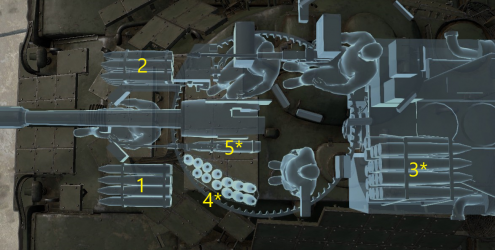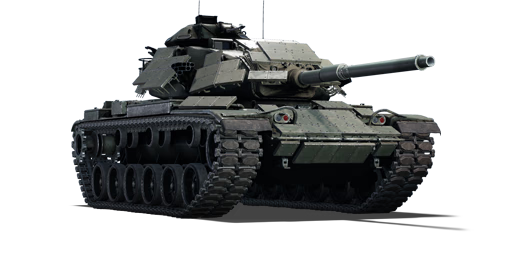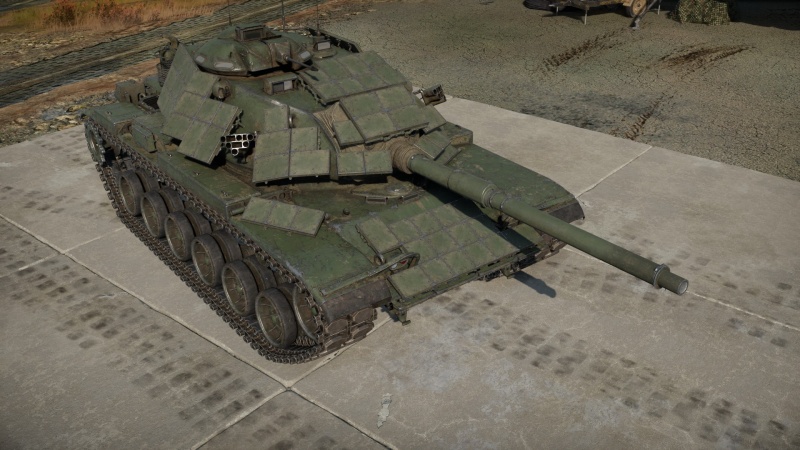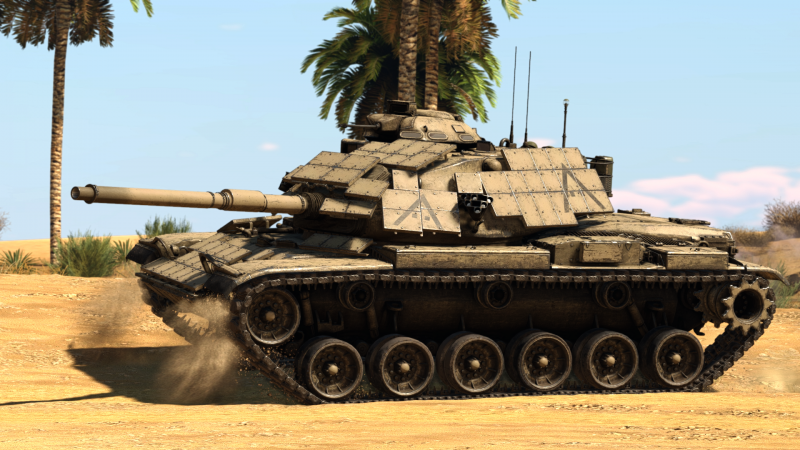M60A3 TTS
| This page is about the American main battle tank M60A3 TTS. For other versions, see M60 (Family). |
Contents
Description
Work began on improvements to the M60A1 in 1972, with the project designated as M60A1E3. The project saw the trial of many different new features, including features that would be implemented in the (RISE) variant. By May 1979, the vehicle was standardized as the M60A3, which saw the use of an AN/VVG-2 laser range-finder, an M21 solid-state ballistic computer, a thermal sleeve around the 105 mm gun, and switching out the coaxial with the M240 machine gun. This was quickly followed up with one more upgrade with an AN/VSG-2 Tank Thermal Sight (TTS) for the gunner. This new gunsight was approved for use and began being installed in August 1979, with the M60A3 receiving this new gunsight designated as the M60A3 TTS. One last upgrade was done in 1988 by adding appliqué armour in the form of explosive reactive armour to improve the overall protection of the tank. The US Army would use the M60A3 TTS until they were replaced by the M1 Abrams, though some M60A3 saw service with the US as late as the 1991 Gulf War by the US Marine Corps.
Introduced in Update 1.95 "Northern Wind", the M60A3 TTS is a great improvement from the preceding M60A1 RISE (P) with an assortment of upgrades to sensors and target acquisition. A thermal gun sight allows for the ability to highlight hot enemy targets in the environment and is coupled with a laser rangefinder to ensure better accuracy for long-distance hits. To bolster the tank's firepower, a new APFSDS is unlockable that can keep the M60A3 TTS competitive against newer opponents. Though the firepower metrics are much improved, the M60A3 TTS is unfortunately still an M60 platform, and the armour and mobility are still quite similar to preceding versions, so it will not be able to take the old and new kind of punishment that may be encountered with the newer tanks. That said, due to the firepower enhancements, the M60A3 TTS makes a great support tank to minimize its deficiencies and emphasize its advantages.
General info
Survivability and armour
The armour layout of the M60A3 TTS is the same as the M60A1 RISE (P). The ERA is very apparent, and each panel offers 370 mm of protection against chemical rounds and a measly 5 mm of protection against kinetic rounds. This is enough to stop the majority of HEATFS rounds that the M60A3 will encounter, but only for the first hit. Impacts from chemical rounds will destroy large swathes of panels, and follow up shots can be lethal. Many ATGMs, particularly those with tandem warheads, can overcome the ERA and damage the tank since the M60 does not have composite armour underneath, so incoming missiles should still be avoided or otherwise dealt with. It should also be noted that the ERA coverage has some gaps, particularly around the turret ring and the gunner's sight.
The underlying base armour is similar to the layout originally featured on the M60A1 (AOS). It consists entirely of cast and rolled homogeneous armour. The frontal hull armour and turret cheeks are fairly thick and can generally shrug off fire from Soviet APHE rounds and autocannons, but the gun mantlet is modeled as having only 127 mm of CHA (with some sloping) and is a major weak point. The turret ring is another weak zone, only 114 mm thick and fairly large in size. The commander's cupola bulges from the top of the turret and is lightly protected, making it an attractive target for APHE and high-calibre HE rounds.
With no specialized protection against APDS or APFSDS rounds, the M60A3's armour should not be trusted. Even weaker chemical rounds can slip between the gaps of the ERA panels with some luck. Considering the tank's unimpressive mobility, enemy flankers are a real concern as well, and nearly every weapon at the M60A3's rank can penetrate the hull sides. Surviving hits should be a pleasant surprise and not an expectation.
Armour type:
- Cast homogeneous armour
- Rolled homogeneous armour (Rear roof, Engine grille)
| Armour | Front | Sides | Rear | Roof |
|---|---|---|---|---|
| Hull | 108 mm (66°) Front Glacis 137 mm (54°) Lower Glacis |
36 - 70 mm | 25 mm (1°) Engine Grille 40 mm (31°) Top 28 mm (61°) Bottom |
36 mm Front 20 mm Engine deck |
| Turret | 215 + 50.8 mm (1-43°) Turret front left 230 + 50.8 mm (4-50°) Turret front right 127 mm (8-57°) Gun Mantlet |
215 - 49 mm | 57 mm | 48 mm Front 25.4 mm Center |
| Armour | Front | Sides | Rear | Roof |
| Cupola | 127 mm | 70 mm | 50 mm | 101.6 mm |
Notes:
- Tracks are 30 mm thick while suspension wheels are 20 mm thick.
- Belly armour is 19 mm in the front, 13 mm in the rear.
- 15 mm RHA plate between the engine and crew compartment.
Mobility
| Game Mode | Max Speed (km/h) | Weight (tons) | Engine power (horsepower) | Power-to-weight ratio (hp/ton) | |||
|---|---|---|---|---|---|---|---|
| Forward | Reverse | Stock | Upgraded | Stock | Upgraded | ||
| Arcade | Expression error: Unexpected * operator. | 1,162 | Expression error: Unexpected round operator. | __.__ | |||
| Realistic | 663 | Expression error: Unexpected round operator. | __.__ | ||||
Modifications and economy
Armaments
Main armament
| 105 mm M68 | Turret rotation speed (°/s) | Reloading rate (seconds) | |||||||||||
|---|---|---|---|---|---|---|---|---|---|---|---|---|---|
| Mode | Capacity | Vertical | Horizontal | Stabilizer | Stock | Upgraded | Full | Expert | Aced | Stock | Full | Expert | Aced |
| Arcade | 63 | -10°/+20° | ±180° | Two-plane | 21.4 | 29.6 | 36.0 | 39.8 | 42.4 | 8.71 | 7.70 | 7.10 | 6.70 |
| Realistic | 13.4 | 15.8 | 19.1 | 21.2 | 22.5 | ||||||||
Ammunition
The M60A3 TTS has the same ammunition selection as the M1 Abrams.
- The M456A2 HEATFS round comes as stock choice, which is refreshing compared to the stock APDS on the M60A1 RISE. The HEATFS round is useful for destroying light targets like IFVs and SPAAs but is more difficult to aim and will struggle against opponents with any ERA and composite armour. The post-penetration damage is not any better, so only a few HEATFS rounds should be kept in reserve for use against light targets.
- The unlockable M393A2 HESH round has potentially more post-penetration damage than the other options, however it has the worst ballistics, the lowest penetration, and is the most difficult to use as a result. For best results, it should be aimed at hull or turret sides and roofs, taking care not to hit ERA, composite armour, or spaced armour. Still, the HEATFS is much more user-friendly for taking out light targets. HESH might be helpful in the occasional unusual situation where a small portion of an enemy tank is exposed, but its crew members are not close enough to the line of fire to be damaged by the APFSDS or HEATFS.
- The unlockable M735 APFSDS dart is effective against most tank targets since it has a higher velocity than the HEATFS round. Moreover, it will not detonate prematurely on light obstacles (trees and fences), and will cut straight through opponents without decent composite armour.
- The final unlockable ammunition choice is the M774 APFSDS dart, which has all-round improved statistics from the M735. In particular, it enjoys significantly better angled penetration. If financial cost is not a factor, it should be the M60A3's ammo type of choice.
- The M416 smoke shell is available too. Obviously, it is not good at damaging enemies, but it can be used to cover advances and blind entrenched targets.
| Penetration statistics | |||||||
|---|---|---|---|---|---|---|---|
| Ammunition | Type of warhead |
Penetration @ 0° Angle of Attack (mm) | |||||
| 10 m | 100 m | 500 m | 1,000 m | 1,500 m | 2,000 m | ||
| M456A2 | HEATFS | 400 | 400 | 400 | 400 | 400 | 400 |
| M393A2 | HESH | 127 | 127 | 127 | 127 | 127 | 127 |
| M735 | APFSDS | 292 | 291 | 284 | 275 | 266 | 257 |
| M774 | APFSDS | 372 | 370 | 365 | 358 | 351 | 343 |
| Shell details | ||||||||||||
|---|---|---|---|---|---|---|---|---|---|---|---|---|
| Ammunition | Type of warhead |
Velocity (m/s) |
Projectile mass (kg) |
Fuse delay (m) |
Fuse sensitivity (mm) |
Explosive mass (TNT equivalent) (kg) |
Ricochet | |||||
| 0% | 50% | 100% | ||||||||||
| M456A2 | HEATFS | 1,174 | 10.5 | 0.05 | 0.1 | 1.27 | 65° | 72° | 77° | |||
| M393A2 | HESH | 732 | 11.2 | 0.1 | 4 | 4.31 | 73° | 77° | 80° | |||
| M735 | APFSDS | 1,501 | 3.72 | - | - | - | 78° | 80° | 81° | |||
| M774 | APFSDS | 1,509 | 3.4 | - | - | - | 78° | 80° | 81° | |||
| Smoke shell characteristics | ||||||
|---|---|---|---|---|---|---|
| Ammunition | Velocity (m/s) |
Projectile mass (kg) |
Screen radius (m) |
Screen deploy time (s) |
Screen hold time (s) |
Explosive mass (TNT equivalent) (g) |
| M416 | 732 | 11.6 | 16 | 5 | 25 | 50 |
Ammo racks

| Full ammo |
1st rack empty |
2nd rack empty |
3rd rack empty |
4th rack empty |
5th rack empty |
Visual discrepancy |
|---|---|---|---|---|---|---|
| 63 | 49 (+14) | 38 (+25) | 17 (+46) | 4 (+59) | 1 (+62) | No |
Note:
- Ammo racks litter the interior of the M60A3 TTS. Avoid taking enough ammunition to fill the turret bustle ammo rack, this way penetrating shots to the turret are less likely to destroy the tank instantly.
Machine guns
| 12.7 mm M85 | ||||
|---|---|---|---|---|
| Mount | Capacity (Belt) | Fire rate | Vertical | Horizontal |
| Pintle | 900 (180) | 626 | -9°/+60° | ±180° |
| 7.62 mm M240 | ||||
|---|---|---|---|---|
| Mount | Capacity (Belt) | Fire rate | Vertical | Horizontal |
| Coaxial | 6,000 (200) | 941 | N/A | N/A |
Usage in battles
The M60A3 TTS lacks the mobility to arrive first on the front lines or easily flank, but the unimpressive protection means that advancing steadily in the open is not a safe proposition either. It is best to follow teammates, stay close to cover, and take advantage of the thermal sight to scan for opponents. A quick glance through the gunner's scope can reveal hidden enemies from afar. The armour and mobility issues are less important if one can consistently catch targets off guard and shoot first, and if the rest of the team is causing a ruckus, all the better. Keep an eye out for flankers and avoid staying out of cover for long.
Thermal sights are very helpful and not quite ubiquitous at the M60A3's rank, but they are not uncommon either. IFVs like the Begleitpanzer 57, BMP-3, and Type 89 have them and can spot the M60A3 easily. Thankfully, these targets are more reliant on ATGMs for long distance combat, which are easier to avoid than APFSDS rounds. They will still pack a huge punch upon a successful hit, so do not stand still. The premium AMX-30 Super, Leopard A1A1 (L/44), and Type 74G all boast thermal sights and superior mobility, making them difficult targets indeed. The only real way to deal with them is to shoot first. It is also possible for the M60A3 TTS to encounter its cousins in the China tree, the M60A3 TTS (China) and CM11. The former does not have ERA and is even more vulnerable while the latter has even worse mobility in exchange for superior firepower; these three tanks all make easy targets for one another.
The MBT-70 currently shares a battle rating with the M60A3 TTS. They are very different tanks and can cover each other's weaknesses to some extent when used as a lineup; when high mobility and aggressive pushes are needed, the MBT-70 (or its devolved sibling, the XM-803) can be used, and when thermal sights and firepower are needed the M60A3 can pick up the slack. None of these options have very good armour, but few opponents at their rank do.
Pros and cons
Pros:
- Adequate 105 mm gun with above average ammo selection
- Equipped with a thermal sight
- ERA offers some chemical protection
- Equipped with a laser rangefinder
- Can be useful in the event of an uptier as a support vehicle thanks to decent firepower and thermal sight
Cons:
- Large target with a tall and noticeable cupola weak spot
- Armour is poor, especially against APFSDS projectiles
- ERA coverage has significant gaps
- Not very mobile; slow acceleration and overall speed due to very low power-to-weight ratio
- Stock M456A2 HEATFS round is ineffective to vehicles with composite armour or ERA
History
The M60
The M60 tank, a descendant of the Patton series of tanks, was the mainstay of US armoured forces for much of the Cold War. It saw much combat in various conflicts like the Yom Kippur War, Iran-Iraq War, and the Gulf War, performing well against Soviet contemporaries like the T-62. Several versions of the M60 were used by the US military, and the last of them was the M60A3.
M60A3
Development
During the 1970s there was a rapid advancement in anti-tank technology, and with the failure of the M60A2 program to produce a sufficient fighting vehicle an upgrade of the M60A1 series was necessary. In 1976, a program to do just that was initiated; the intention was to increase the turret armour and to modernize and improve the technological systems in the tank. The product of the program was the M60A3 tank, a significant improvement over the M60A1 series. Despite the improvement over the earlier M60 models, the M60A3 was viewed as a stop-gap measure, as the M1 Abrams was already being developed and was planned to enter service in 1981.
M60A3 Passive
This was the first model of the M60A3 series; it was known simply as the M60A3, but was also known as the M60A3 Passive in order to better distinguish it from the later M60A3 TTS. The M60A3 was based on the M60A1 RISE Passive tank, but with a number of upgrades for the turret - most notably changes to the armour and fire control system. The armour on the turret face was increased to 276 mm and the armour on the gun mantlet was changed to 330 mm. The M60A1 RISE Passive tanks uses a coincidence rangefinder and the mechanical M19 ballistic computer. The M60A3 received the M21 fire control system which includes an AN/VVS2 flash-lamp pumped ruby-laser rangefinder for the commander and gunner, solid-state M21E1 gun data computer, improved stabilization mechanism, improved electrical system, and an improved solid-state analog data card bus. The M10A2E3 ballistic drive is an electro-mechanical unit.The commander received an M36E1 passive periscope and the gunner received an M32E1 passive sight. The hydraulic fluid in the turret was changed to a type that was non-flammable. The M60A3 turret was mounted on the chassis of the M60A1 RISE Passive hull, with the same AVDS-1790-2D RISE engine and CD-850-6A transmission, with a Halon fire-suppression system. A total of 748 M60A3 Passive tanks were built, and all were later upgraded to the M60A3 TTS standard.
M60A3 TTS
The M60A3 TTS was an improved model of the earlier M60A3. The gunner received an AN/VSG2 Tank Thermal Sight (TTS), which was the only major improvement over the M60A3 Passive. 304 M60A3 TTS tanks were built (with production ending in 1983), 1,391 of the US Army M60A1 RISE tanks were converted to the M60A3 TTS standard by the Anniston Army Depot and Mainz Army Depot by 1990, and all 748 US Army M60A3 tanks were also upgraded to the TTS standard by 1984.
Production
In February of 1978, the first M60A3 tanks were finished at the Detroit Arsenal Tank Plant. The low-rate initial production run was completed at the DATP in October, which consisted of 296 M60A3 tanks; the tanks were first fielded by the US Army in May of 1979. Chrysler Defense was purchased by General Dynamics Land Division in 1982. In May 1983, production of the M60A3 ended with a total of 1,052 M60A3 and M60A3 TTS tanks built; 748 of the tanks were of the Passive version, and 304 were of the TTS version. At this time, the Detroit Tank Plant closed, and production of the M1 Abrams was at the Lima Tank Plant in Ohio. Despite this, the conversion of earlier M60 tanks to the M60A3/E60B standard was still occurring, specifically for other nations through the Foreign Military Sales program. The last M60A3 tanks were delivered through the FMS in May of 1986 to Israel, with a total of 3,268 tanks converted. The tanks upgraded for Israel were surplus US Army M60A1 RISE tanks. Earlier M60 tanks were also converted to the M60A3 TTS standard for the US Army. 1,391 of the US Army M60A1 RISE tanks were converted to the M60A3 TTS standard by the Anniston Army Depot and Mainz Army Depot by 1990, and all 748 US Army M60A3 tanks were also upgraded to the TTS standard by 1984.
Service and Export
The M60A3 eventually replaced all US Army M60A1 and M48A5 tanks (used by the National Guard until 1987) in service. But, the Marine Corps still used the M60A1 RISE tanks until the M60 was retired from front line service in 1991. The official full name of the M60A3 was Tank, Combat, Full Tracked: 105-mm Gun, M60A3. It was also known as the 105 mm Gun Tank M60A3.
The M60 was designated as the E60 for export by the US Foreign Military Sales (FMS); the original M60 was designated as the E60, the M60A1 series was designated as the E60A, and the M60A3 series was designated as the E60B. The last M60A3 tanks were delivered through the FMS in May of 1986 to Israel, with a total of 3,268 tanks converted. Other nations including Italy, Austria, Greece, Morocco, and Taiwan upgraded their M60s to the M60A3 standard through FMS contracts with Raytheon and General Dynamics in the 1980s. In 1990, surplus M60A3/E60B tanks were sold to Oman, Bahrain, and Saudi Arabia.
Several companies offer or have offered upgrade packages for the M60A3, such as the Leonardo M60A3 (from Italy), the Raytheon M60A3 SLEP (from the US), the Magach series (from Israel), and the M60T Sabra series (developed by an Israeli company but used by Turkey). These attempt to increase the firepower and protection of the M60 to modern levels, often featuring 120 mm guns, add-on composite armour, and active protection systems. While the M60 is an old design, its cheap cost and room for upgrades will likely keep it in service for years to come, not unlike the Soviet T-54/55 series.
Media
- Skins
- Videos
See also
- M60 (Family) - The family/history page for the M60
- M60A3 TTS (Taiwan) - An M60A3 TTS in service with Taiwan, found in the Chinese tech tree.
External links
- [Global Security] M60A3 Patton Tank Thermal Sight (TTS)
- [The Marine Corps Mechanized Museum] M60A3 Main Battle Tank
| Chrysler Defense | |
|---|---|
| MBTs | |
| M48 Patton | M48A1 |
| M60 | M60 · M60A1 (AOS) · M60A2 · M60A1 RISE (P) · M60A3 TTS |
| M1 | XM1 (Chrysler) · M1 Abrams |
| Export | |
| M48 | M48A2 C · M48A2 G A2 · ␗M48A1 · Magach 1 · Magach 2 |
| M60 | ␗M60A3 TTS · M60A1 "D.C.Ariete" · |
| Note | Chrysler Defense was purchased by General Dynamics Land Systems (GDLS) in 1982. |
| USA medium tanks | |
|---|---|
| M2 | M2 |
| M3 | M3 Lee · ▃Grant I |
| M4 | M4 · Calliope · M4A1 · M4A1 (76) W · M4A2 · M4A2 (76) W · M4A3 (105) · M4A3 (76) W · M4/T26 |
| M26 Pershing | T20 · T25 · M26 · M26 T99 · M26E1 |
| M46/47/48 Patton | M46 · M46 "Tiger" · M47 · M48A1 · T54E1 · T54E2 |
| M60 | M60 · M60A1 (AOS) · M60A1 RISE (P) · M60A2 · M60A3 TTS · M728 CEV · 120S |
| MBT-70 | MBT-70 · XM803 |
| M1 Abrams | XM1 (Chrysler) · XM1 (GM) |
| M1 Abrams · M1 KVT · IPM1 | |
| M1A1 · M1A1 HC · M1A1 Click-Bait | |
| M1A2 Abrams · M1A2 SEP · M1A2 SEP V2 | |
| Other | T95E1 |
| Australia | M1A1 AIM |
| Canada | M4A5 |
| Israel | ▃Magach 3 (ERA) · ▃Merkava Mk.1 · ▃Merkava Mk.2B · ▃Merkava Mk.3D |
| Turkey | M60 AMBT |






